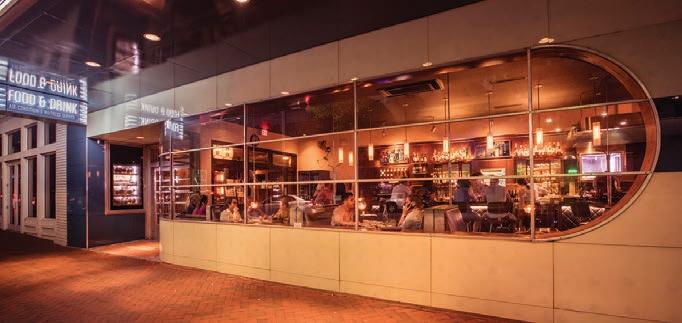
4 minute read
Giving Back: The Grey
The Grey managing partner John O. Morisano and executive chef and partner Mashama Bailey
GIVING BACK
Lending Their Voices
The Grey’s partners step up for struggling restaurants nationwide
FROM THE TIME THE GREY WAS
just an idea, proprietors John O. Morisano and Mashama Bailey envisioned an Old World wine program, featuring balanced, light-bodied varieties that enhanced executive chef Bailey’s regionally sourced menu.
So when a 25 percent tariff on European wine, spirits and food arrived in late 2019 — the latest escalation in a 17-year-old trade dispute over how the U.S. and the European Union subsidize their respective commercial airline industries, of all things — hit the struggling hospitality industry, The Grey partners knew they had to get involved.
Bailey and Morisano joined the national leadership team of the Coalition to Stop Restaurant Tariff s (CSRT), in the company of renowned chefs and restaurant owners like Daniel Boulud, Thomas Keller, Danny Meyer and Alice Waters. The coalition
fi ghts for relief for small and independent restaurant owners, already facing staggering challenges amid the COVID-19 pandemic, by calling for lawmakers and the Biden administration to keep them out of tariff tiff s.
Without pandemic aid, nearly 40 percent of Georgia’s restaurants and bars could close within six months, according to a December study by the Georgia Restaurant Association. The tariff s added yet another burden to food and beverage providers by increasing the price of steady profi t drivers like wine by the glass, and adding to the cost of imported cheese and meats that are essential to the fi ne-dining experience. Those costs were often passed on to the customer, who might fi nd it diffi cult to understand why a standoff between Boeing and Airbus meant they had to pay more for their favorite bottle of red.
While the tariff s did not aff ect the food menu at The Grey, which prizes seasonal and regional produce, seafood and meat, they signifi cantly added to the costs associated with procuring European wines to enhance the ingredients that grow nearby and come out of local waters. The blend of Old World and new echoes the methods and ingredients inherent to the melting-pot cuisine of port

cities like Savannah, Morisano says.
That gives restaurant owners the additional task of sourcing new ingredients that meet the standards their guests expect — or else fi nding another way to cut costs, like laying off staff or diminishing support for local producers. The goal of a restaurant like The Grey is to create a guest experience that inspires support of a small business, where 90 to 95 cents on the dollar go back into the community. The ripple of ill eff ects from a European winemaker to a Lowcountry farmer make the tariff s a much larger issue than the cost of a fancy bottle of wine, olive oil or prosciutto di parma ham, says Morisano, who has been educating decision-makers about the issue through his and Bailey’s work with the CSRT.
This spring, the coalition had reason to celebrate. In March, the Biden administration temporarily suspended tariff s for four months with plans to negotiate “a balanced settlement to the disputes.” In a statement from the leadership team, the CSRT applauded the decision and its positive impact on chefs, line cooks, sommeliers, servers and every other restaurant worker. “Our industry should never have been pawns in a fi ght over aircraft subsidies.”
There will defi nitely be “a hangover” from the tariff s, though, Morisano says: The fourmonth reprieve leaves many restaurateurs like himself sitting on inventory purchased at cost. Still, the coalition is hopeful that a trade truce will help keep the industry afl oat. Representing restaurants and suppliers in all 50 states and top kitchens from New York to California, the organization will continue to apply pressure to lawmakers and the Federal Trade Commission to fi nd a truce that permanently scraps the tariff s.
Here in Georgia, where Morisano and Bailey work on the leadership team with chefs like Steven Satterfi eld of Atlanta’s Miller Union, that means persuading Georgia’s newly elected senators Jon Ossoff and the Rev. Raphael Warnock to step up to the plate.
The Grey










